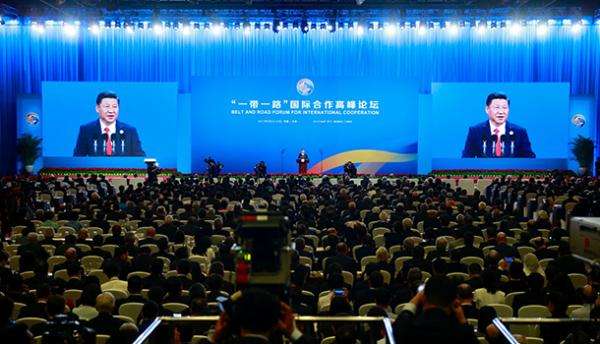China's 'Belt and Road' at the epicenter of attention

By George N. Tzogopoulos
China is again in the headlines of international media. The organization of the 'Belt and Road Forum for International Cooperation' in Beijing is bringing together world leaders, organizations, ministers diplomats and academics to discuss future cooperation steps. Important meetings are also expected to take place on the sidelines of the event which can pave the way for the establishment of stronger ties between different countries. Only a few months after the successful organization of the G20 Summit in Hangzhou, the Chinese administration is further boosting its integration aspirations.
When President Xi Jinping talked for the first time about his intention to revitalize the ancient Silk Road in September 2013, following steps could not be easily anticipated. The promotion of interconnectedness via infrastructure works was an attractive idea but difficult to be implemented. This was due to the magnitude of the project, the vast geographical area it would cover with land as well as maritime routes and differences among countries participating in it at the political, economic and cultural level.
However, less than four years later results are already impressive. Sometimes, numbers can speak for themselves. 65 countries and regions are involved in the 'Belt and Road' initiative with a population of 4.4 billion people and a total GDP of $23 trillion. These numbers represent 63 percent of the world population and 29 percent of the world GDP. According to vice-head of the National Development and Reform Commission (NDRC), Ning Jizhe, Chinese companies have invested over $60 billion in countries involved.
The Beijing International Forum takes place at a favorable juncture for the realization of the 'Belt and Road' policy. President Xi has personally invested in the success of the event extending invitations to his counterparts in the previous months. Under his leadership China has been steadily grown into a critical player with a strong voice in international affairs. The 'Belt and Road' initiative is the flagship in his foreign policy.
Several countries can offer their own experiences from taking part in the revitalization of the ancient Silk Road. Asia, Africa and Europe are the continents which have seen China expand its presence in ports, airports, railways and the sectors of construction and energy. From the geographical perspective of the author, for instance, Greece constitutes a model case. The investment of COSCO in the Piraeus port has increased the revenues of the Chinese company and has also benefited the Greek economy, which seeks to escape recession and create new jobs. Also, Greece – a gateway to the EU – functions as a hub from where commodities can be transported to the Balkans and from there to Central and Eastern Europe.
In recent years, especially after the 'Belt and Road' initiative started to develop, China has employed the 'win-win' term in its diplomatic dictionary. This means that both sides can benefit when this policy is exerted: China and the relevant country where the new Silk Road passes from. Critics of Beijing believe that recipients of Chinese investments should be careful about its motivations though. They warn that critical infrastructure should not be controlled by foreign powers like China. American think tanks systematically develop this argumentation.
Beijing regularly reiterates that its 'Belt and Road' initiative is principally an economic plan. It concentrates on trade, investments, exports and general profits while it downplays geopolitical interests. Obviously, China's international role is gradually expanding but this does not entail that it seeks to alter the balance of power or challenge the existing status quo. In the final account, it is able to offer liquidity or loans at good interest rates to countries suffering by limited financial resources and desperately endeavoring to kick-off their national economies. As far as the EU is concerned, it is practically accepting this reality by being prepared to use public guarantees for attracting foreign money, for example from China. This is how the investment plan of the European Commission has found common ground with the 'Belt and Road' initiative.
Although business will be the priority at the Beijing international forum, it will be perhaps equally important to send a clear message about the contribution of the new Silk Road to peace. As opposed to what some critics argue, China remains committed to the preservation of calmness and stability. Α geographical area where joint economic interests are pursued, where tourists are travelling, and ancient civilizations are following – in harmony – the rules of new technologies can be the basis for peace and prosperity. This is perhaps Xi's grand vision for the next generation.
The Beijing International Forum will attract international attention for some time. More importantly, it will have continuity after guests depart for their destinations because the project is lively and progressing fast. Even the heads of state who are not present in the Chinese capital these days, will remain committed to the implementation of the 'Belt and Road' policy, if their countries are involved. China's success is thus being guaranteed.
Dr George N. Tzogopoulos is a lecturer at the European University in Nice, France and the Democritus University in Thrace, Greece. He is also a research fellow at the Centre International de Formation Européenne (CIFE), the Hellenic Foundation for European and Foreign Policy (ELIAMEP) where he coordinates its Asian Studies Programme and a research associate at the European Council of Foreign Relations (ECFR). George is also the founder of chinaandgreece.com an institutional partner of CRI Greek.






